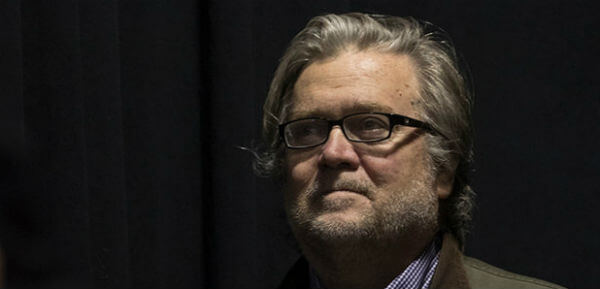
Time reports: Sometime in the early 2000s, Bannon was captivated by a book called The Fourth Turning by generational theorists William Strauss and Neil Howe. The book argues that American history can be described in a four-phase cycle, repeated again and again, in which successive generations have fallen into crisis, embraced institutions, rebelled against those institutions and forgotten the lessons of the past–which invites the next crisis. These cycles of roughly 80 years each took us from the revolution to the Civil War, and then to World War II, which Bannon might point out was taking shape 80 years ago. During the fourth turning of the phase, institutions are destroyed and rebuilt.
In an interview with TIME, author Howe recalled that Bannon contacted him more than a decade ago about making a film based on the book. That eventually led to Generation Zero, released in 2010, in which Bannon cast the 2008 financial crisis as a sign that the turning was upon us. Howe agrees with the analysis, in part. In each cycle, the postcrisis generation, in this case the baby boomers, eventually rises to “become the senior leaders who have no memory of the last crisis, and they are always the ones who push us into the next one,” Howe said.
But Bannon, who once called himself the “patron saint of commoners,” seemed to relish the opportunity to clean out the old order and build a new one in its place, casting the political events of the nation as moments of extreme historical urgency, pivot points for the world. Historian David Kaiser played a featured role in Generation Zero, and he recalls his filmed interview with Bannon as an engrossing and enjoyable experience.
And yet, he told TIME, he was taken aback when Bannon began to argue that the current phase of history foreshadowed a massive new war. “I remember him saying, ‘Well, look, you have the American revolution, and then you have the Civil War, which was bigger than the revolution. And you have the Second World War, which was bigger than the Civil War,'” Kaiser said. “He even wanted me to say that on camera, and I was not willing.”
Howe, too, was struck by what he calls Bannon’s “rather severe outlook on what our nation is going through.” Bannon noted repeatedly on his radio show that “we’re at war” with radical jihadis in places around the world. This is “a global existential war” that likely will become “a major shooting war in the Middle East again.” War with China may also be looming, he has said. This conviction is central to the Breitbart mission, he explained in November 2015: “Our big belief, one of our central organizing principles at the site, is that we’re at war.” [Continue reading…]
The cover of Time magazine brands Bannon as “The Great Manipulator,” and however accurately that might describe him, it is an image that serves Trump’s interests in this regard: it turns Bannon into Trump’s insurance policy by availing the so-called president with the option of firing Bannon rather than admit the failure of his presidency. Indeed, it’s reasonable to assume that Trump will sooner declare the failure of America than ever take responsibility for his own actions.

